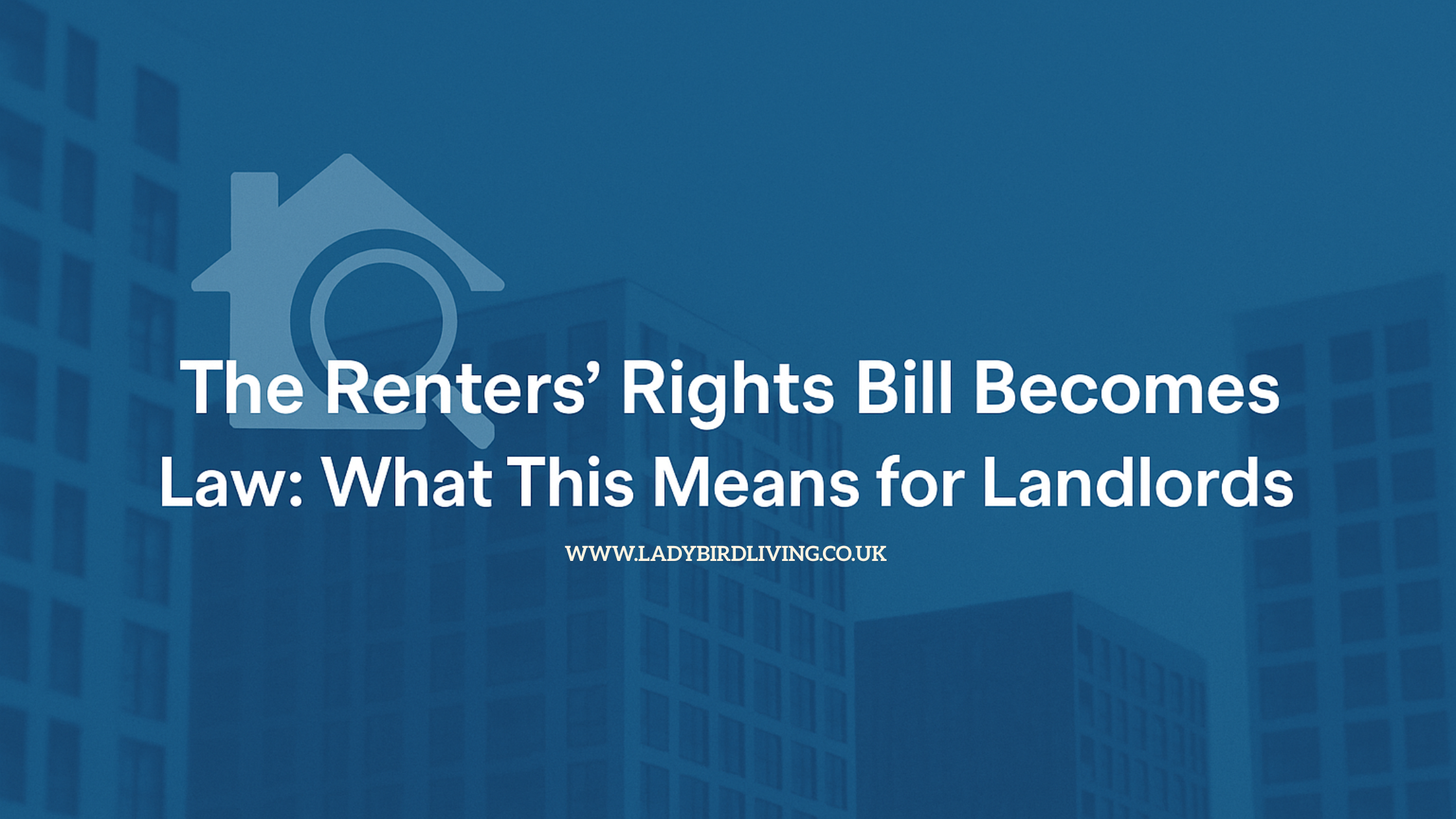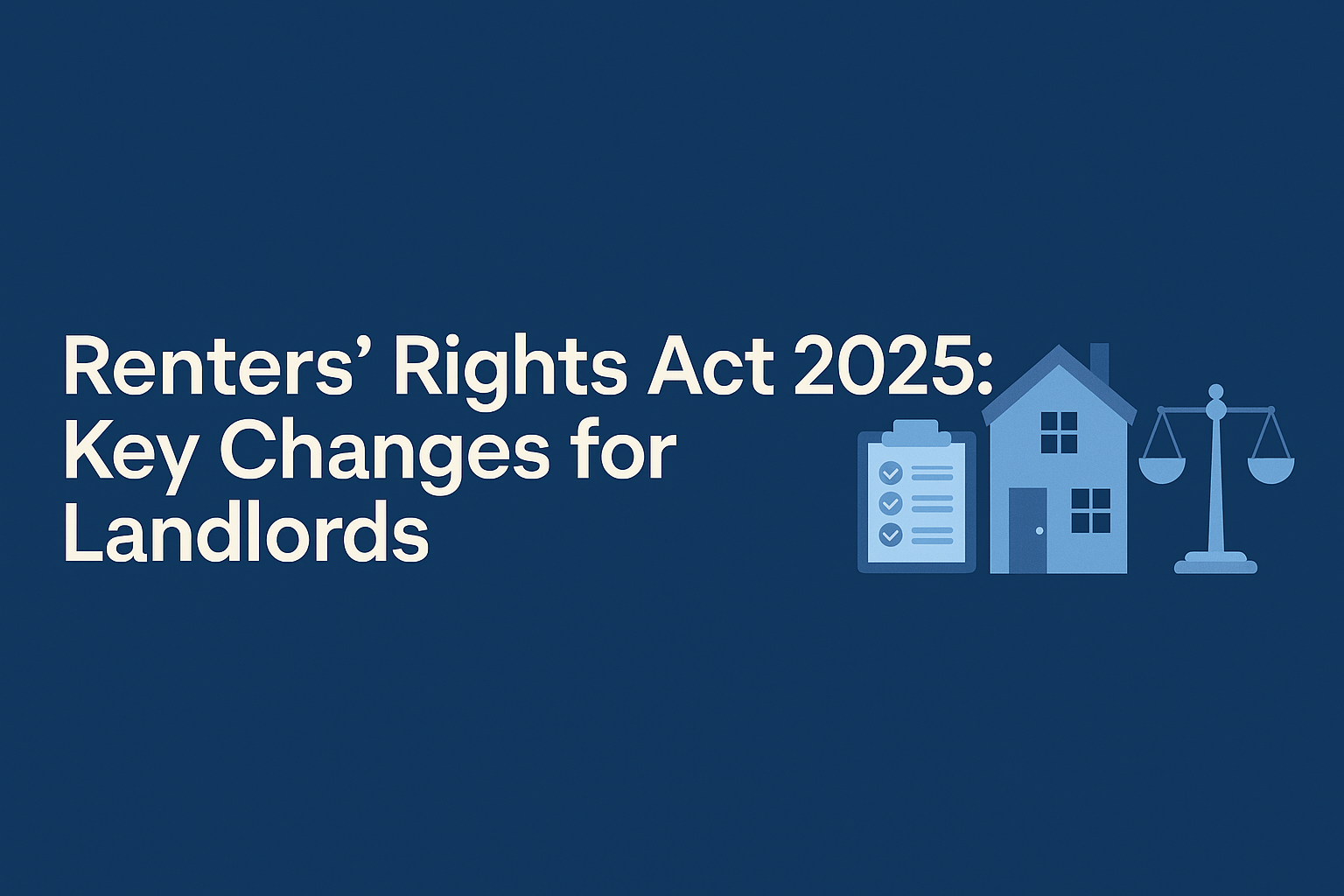Last updated: October 2025
Expected next step: January 2026
Applies to: Assured Shorthold Tenancies (ASTs)
After months of anticipation, the Renters’ Rights Bill has officially received Royal Assent, marking one of the most significant shake-ups in the rental sector in a generation. This landmark legislation, now an Act of Parliament, sets out to rebalance the relationship between landlords and tenants across England.
But with the ink barely dry, many are asking the same question: what happens next?
Key Changes Introduced by the Renters’ Rights Act
The Renters’ Rights Act ushers in sweeping reforms aimed at improving standards and fairness in the rental market. Among the headline changes are:
A new standard tenancy structure for private renters
A Decent Homes Standard applied to private rental housing
Stricter rules around advertising, rent advances, and bidding wars
The abolition of Section 21 ‘no-fault’ evictions
Updated Section 8 possession grounds
Limits on rent increases and greater transparency
A new PRS database and Ombudsman scheme that all landlords must join
Tougher penalties for non-compliance with fines up to £40,000
These reforms are designed to make renting fairer, safer, and more transparent, but they also introduce a wave of new responsibilities for landlords.
Further details about each of the above changes are provided at the end of this blog.
When Will Each Part of the Act Come into Force?
While the Act has passed into law, not all its provisions take effect immediately. The Government will soon announce a staged implementation timeline outlining when each part of the Act will come into force.
In the short term:
Some local authority enforcement powers will kick in within two months.
Major tenancy reforms, including the end of fixed-term tenancies and abolition of Section 21, will follow once the “commencement date” is announced.
Ministers have promised landlords and tenants “sufficient notice” before the main changes take effect. Industry bodies are urging for at least six months’ lead time to prepare.
How to Prepare
For landlords, preparation is everything. Now is the time to:
Review and update tenancy agreements and documentation
Ensure properties are compliant with all current safety and quality standards
Inspect and document your properties
Check that your letting agent is ready for the upcoming changes
Existing tenancies will automatically convert to periodic agreements, and landlords will be required to issue updated information and, where needed, written tenancy agreements.
Student landlords should pay particular attention to the new notice requirements. Under the Act, if you wish to rely on the student possession ground to regain your property at the end of the academic year, you must inform your tenants within the first month after the new law comes into effect. This written notice is essential to ensure that possession can be legally regained once the tenancy ends.
Enforcement, Penalties & Compliance
Local councils will soon have enhanced powers to inspect rental properties, demand compliance documentation, and issue civil penalties of up to £40,000.
Fifteen new offences have been introduced, alongside expanded rent repayment orders, allowing tenants to reclaim up to two years of rent for certain breaches.
Staying Ahead of the Curve
While the scale of reform may feel overwhelming, it also presents an opportunity for the sector to raise standards and modernise.
Professional bodies and tech innovators are already responding with tools and resources to help landlords adapt, from digital compliance tracking and document storage platforms to specialised training courses on the new law.
For landlords who want to stay ahead, the message is clear: start preparing now. Review your paperwork, stay informed, and leverage available support.
❓ Common Questions About the Renters’ Rights Act
1. Are there any tenancies that the new law will not apply to?
Yes. Certain types of tenancies will remain unaffected.
The new legislation only applies to assured tenancies. This means that if a property is let to a company, it will not fall under the scope of the new Act.
Additionally, where the rent is below £250 per year (or below £1,000 per year in London or Greater London) and more than £100,000 per year, the arrangement will be classed as a common law tenancy rather than an assured tenancy, and the new law will not apply.
The Act will also not cover farmhouses let as part of agricultural holdings (under the Agricultural Holdings Act or Farm Business Tenancy Agreements) or properties let with more than two acres of agricultural land.
2. Is it too late for landlords to serve a Section 21 notice on an existing AST?
Not yet.
Landlords can still serve a Section 21 notice on an existing Assured Shorthold Tenancy (AST), if it is done before the date when it will no longer be possible to grant new ASTs. This cut-off point will coincide with the commencement of the part of the Act that automatically converts ASTs into periodic tenancies, though this date has not yet been confirmed.
If a valid Section 21 notice is served before that date, the tenancy should end in line with the notice and will not automatically convert into a monthly periodic tenancy.
However, landlords must act promptly. If a tenant does not vacate when the notice expires, possession proceedings should be started as soon as possible (generally within three months of the Act coming into force). Failing to do so could mean the tenancy converts into a periodic one and becomes subject to the new rules.
Wrapping up: what these changes mean in practice
The Renters’ Rights Act brings big structural shifts, but the real test will be how it affects the day-to-day running of your rental business. Here’s a closer look at what each of these changes means in practice:
No more ‘no-fault’ evictions (Section 21)
Section 21 evictions are being abolished, which means landlords will need to rely on updated Section 8 grounds when seeking possession. These include serious rent arrears, anti-social behaviour, or needing to sell or move back in. Updated court forms and guidance will follow once the new rules officially begin. For now, keep your paperwork in order. Maintain rent ledgers, inspection notes, and a dated record of all communications, as these will be key if you ever need to make a possession claim.
From fixed terms to rolling tenancies
The familiar fixed-term AST is being phased out, and all tenancies will move to a single rolling model. Tenants will be free to leave with notice, and landlords will need to rely on statutory grounds to regain possession. If you rely on fixed terms for business planning such as refurbishments or sales, start mapping timelines early and seek legal advice once commencement dates are confirmed.
Rent increases, bidding and deposits
Rent rises will be limited to once per year, with a route to challenge excessive increases through the First-tier Tribunal. “Bidding wars” above an advertised rent will be banned and a new “lifetime” deposit system is being developed. Some action points include: publish clear asking rents, track local comparables, and speak to your deposit protection provider about how transferable deposits will work once details are released.
Tenant protections: pets, families and benefits
Blanket bans are ending. Landlords will need to consider reasonable requests from tenants with children, pets, or those receiving benefits. Reasonable pet clauses or insurance requirements will still be possible, with full details to come in future guidance.
Property standards and Awaab’s Law
From October 2025, social landlords will face strict timelines to fix serious hazards such as damp and mould under Awaab’s Law. Private landlords are likely to follow soon after. A reformed Decent Homes Standard is also expected to extend across the private sector. Now is the time to prepare. Audit for damp, heating and ventilation issues, and set up a fast-track repair process with clear records of works completed.
A Turning Point for Renting in the UK
The Renters’ Rights Act represents a defining moment in the evolution of the private rented sector. It is a bold step toward a fairer, safer, and more transparent rental landscape, one that demands greater professionalism but promises stronger, more sustainable relationships between landlords and tenants.
At Ladybird Living, we will continue to monitor these developments closely and share insights to help landlords, tenants, and property professionals navigate the road ahead with confidence.
The information in this post is valid to the best of our knowledge on the date of posting. It is advised that you seek independent advice based on your individual circumstances.
T: +44 (0)203 488 1488







